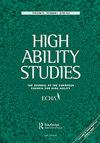Why I believe I achieve determines whether I achieve
IF 1.8
4区 教育学
Q2 EDUCATION, SPECIAL
引用次数: 38
Abstract
Abstract The beliefs and values students hold toward themselves, given tasks, and achievement itself can influence what tasks students seek, and whether they are able to obtain them. On the basis of previous research on underachievement and motivation, we developed the Achievement Orientation Model (AOM) to explore the issue of student achievement. The model posits that individuals’ self-perceptions in three areas (self-efficacy, goal valuation, and environmental perceptions) interact to motivate students to self-regulate their behaviors and subsequently engage and achieve. Further, societal and cultural values influence students’ attitudes in the three areas of self-efficacy, goal valuation, and environmental perceptions, as well as their ability to self-regulate, through students’ interactions with their peers, parents, and teachers. In this paper, we discuss the components of the AOM, as well as the importance of talent development perspectives on shaping student attitudes that promote engagement and ultimately high levels of achievement.我为什么相信我成功决定了我是否成功
学生对自己、给定任务和成就本身的信念和价值观会影响学生寻求什么任务,以及他们是否能够获得这些任务。在前人研究成绩不足与动机的基础上,我们建立了成绩取向模型(AOM)来探讨学生成绩问题。该模型假设个体在三个方面的自我感知(自我效能、目标评估和环境感知)相互作用,激励学生自我调节自己的行为,并随后参与和实现。此外,社会和文化价值观通过学生与同伴、父母和老师的互动,影响学生在自我效能感、目标评价和环境感知三个方面的态度,以及他们的自我调节能力。在本文中,我们讨论了AOM的组成部分,以及人才发展观点对塑造学生态度的重要性,这些态度促进了学生的参与,并最终取得了高水平的成就。
本文章由计算机程序翻译,如有差异,请以英文原文为准。
求助全文
约1分钟内获得全文
求助全文
来源期刊

High Ability Studies
Multiple-
CiteScore
4.80
自引率
11.10%
发文量
7
期刊介绍:
High Ability Studies provides a forum for scholars in a variety of disciplines associated with the development of human abilities to their highest level. It is a medium for the promotion of high ability, whether through the communication of scientific research, theory, or the exchange of practical experience and ideas. The contents of this journal are unique in reflecting concerns and recent developments in this area from childhood and across the whole life span in a variety of contexts. Far from being restricted to the traditional focus on high-level cognitive development, it also presents investigations into all other areas of human endeavour, including sport, technology, the arts, business, management and social relations.
 求助内容:
求助内容: 应助结果提醒方式:
应助结果提醒方式:


